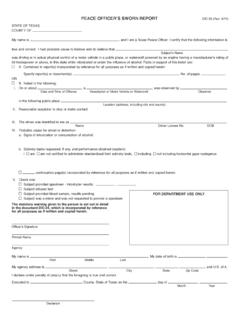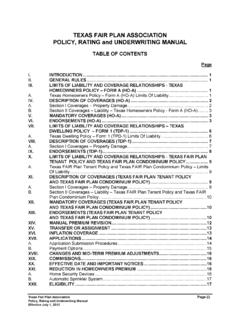Transcription of TEXAS MARITAL PROPERTY LAW - Yale Law Firm, P.C.
1 Yale Law Firm PC Page 1 TEXAS MARITAL PROPERTY LAW MARITAL PROPERTY law in TEXAS is based upon the community PROPERTY system. Although some Texans regard the community PROPERTY system as an unfathomable mystery, actually its rules are fairly easy to understand. They are also flexible because spouses who do not like the application of the rules to their situation can change the rules by written agreement either before marriage (called a premarital PROPERTY agreement) or during the marriage (called a MARITAL PROPERTY agreement or community PROPERTY partition agreement).
2 It is perhaps easiest to understand this system by imagining a hypothetical entity, known as the community, that owns the community assets of the husband and wife. The husband and wife each have an undivided one-half (1/2) interest in the community. In addition to community PROPERTY , TEXAS also recognizes the status of some PROPERTY as separate PROPERTY . The characterization of PROPERTY as separate PROPERTY or community PROPERTY is significant in dividing PROPERTY upon termination of the marriage by divorce or death.
3 Characterization of PROPERTY Separate PROPERTY includes PROPERTY that is owned by either spouse before the marriage, PROPERTY that is acquired during the marriage by gift, will, or inheritance, and PROPERTY that is purchased with separate PROPERTY funds. Also, separate PROPERTY can be created by the spouses with a written agreement partitioning or exchanging community PROPERTY . Community PROPERTY is defined by exclusion as all PROPERTY other than separate PROPERTY .
4 The most common types of community PROPERTY include salary, wages, and income generated from both community PROPERTY and separate PROPERTY . Some are surprised to learn that dividends and income earned on separate PROPERTY investments are not separate PROPERTY , but instead are community PROPERTY . Separate PROPERTY vs. Community Separate PROPERTY Community PROPERTY Owned by spouse before marriage. Salary and wages. Income from separate and community Acquired during marriage by gift, PROPERTY .
5 Will, or inheritance. Assets acquired during marriage.* Purchased during marriage with Assets acquired on credit during separate funds. marriage.* Community PROPERTY partitioned or Assets on hand at dissolution of exchanged by written agreement. marriage.* *Presumptively community PROPERTY . There is a presumption in TEXAS that all assets owned by a husband and wife are community PROPERTY . All assets acquired during the marriage presumptively belong to the community. All assets on hand during the marriage, and on dissolution of the marriage by death or divorce, are presumptively community assets.
6 Separate PROPERTY must be proven to be separate by the spouse Yale Law Firm PC Page 2 asserting that it is separate by clear and convincing evidence. Planning Idea: Persons about to be married with substantial PROPERTY to be brought to the marriage may want to consider a Premarital PROPERTY Agreement so the separate PROPERTY is recognized by both parties. Inception of Title In those cases where classifying the assets is required, TEXAS applies the inception of title rule.
7 Under this rule, the character of the asset as separate or community PROPERTY is determined at the time the asset is acquired. Subsequent events, such as the payment of a mortgage, do not change the character of the asset. Consider the following example: Example 1: A single man acquires a residence and agrees to pay a mortgage. Shortly thereafter, he marries and the mortgage payments are thereafter made from community PROPERTY funds. The home will be the separate PROPERTY of the husband.
8 Upon death or divorce, the wife may have a claim for the expenditure of community finds to pay the principal portion of the mortgage, but that does not affect the separate PROPERTY ownership by the husband. There is no claim by the community for the interest portion of the mortgage, because the community received the use of the residence. The effect of the inception of title rule on the characterization of assets becomes important for those who move to TEXAS from a common law In common law states, each spouse s salary is that spouse s separate PROPERTY and title to PROPERTY determines ownership.
9 If PROPERTY was one spouse s separate PROPERTY in another state, it remains that spouse's separate PROPERTY when it is brought to TEXAS . The rationale behind this rule is to assure that people do not lose rights in PROPERTY by moving to TEXAS . Consider the following example: Example 2: A husband and wife live in Atlanta, Georgia. Title to their investment securities is in the husband s name. They sell the securities and move to TEXAS . They use the $30,000 in proceeds from the sale of the securities to make a down payment on a house in TEXAS and finance the balance of $70,000.
10 Because the securities were the husband's separate PROPERTY , the $30,000 in proceeds remained the husband's separate PROPERTY when they moved to TEXAS . As a result, the TEXAS house is 30% husband's separate PROPERTY and 70% community PROPERTY . 1 Common law states are all states other than the community PROPERTY states of Arizona, California, Idaho, Louisiana, Nevada, New Mexico, TEXAS , Washington and Wisconsin.








